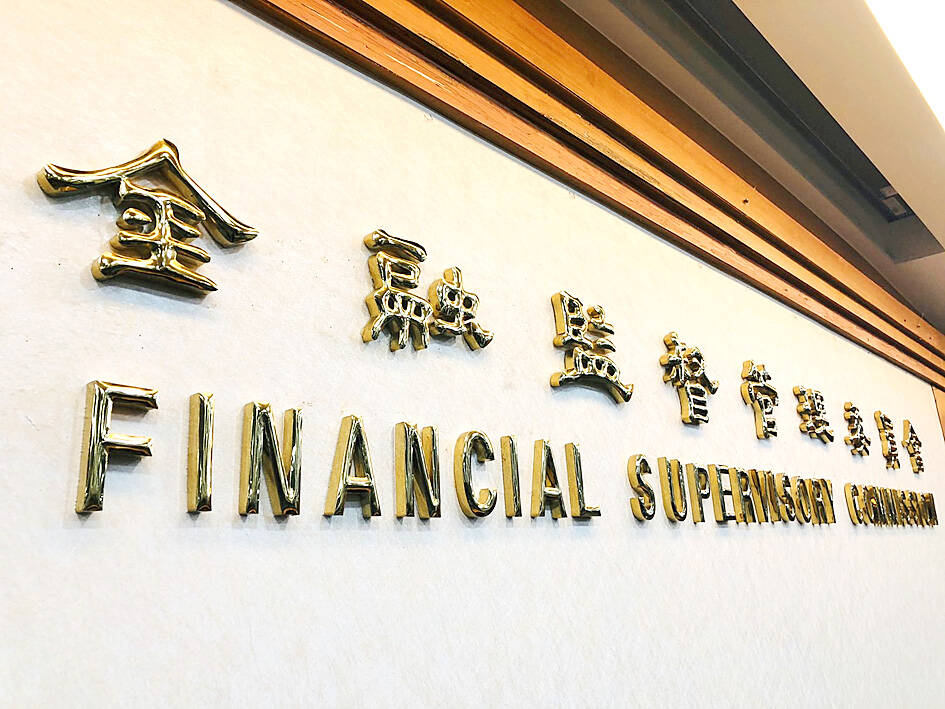The Financial Supervisory Commission (FSC) fined local firms, mostly financial institutions, a total of NT$185.42 million (US$5.8 million) in the first eight months of the year for internal control, financial services misconduct and corporate governance-related breaches, data released last week by the commission showed.
The fines increased 20.2 percent from the NT$154.22 million imposed during the same period last year and reached about 59 percent of the commission’s targeted penalties of NT$313 million for the whole of this year, the commission said, adding that the fines were meted out to firms to correct their deficiencies, not as a means of generating income.
In Taiwan, banks, insurance companies and securities and futures firms obtain special licenses from the government to operate their businesses, but at the same time they also face penalties and disciplinary measures from respective regulators — namely the Banking Bureau, the Insurance Bureau and the Securities and Futures Bureau — if they contravene laws and regulations.

Photo: Kelson Wang, Taipei Times
In addition to fines, the regulators’ penalties include corrections, improvement requirements, warnings and restrictions, as well requiring that a company dismiss or suspend directors, supervisors and managers.
In the January-to-August period, the financial penalties imposed by the Banking Bureau were NT$82.895 million, up 32 percent from a year earlier, with the top three fines levied on CTBC Financial Holding Co (中信金控) and CTBC Bank Co (中信銀行), the commission’s data showed.
According to the commission, the Banking Bureau fined CTBC Financial NT$30 million in August for corporate governance breaches after a major shareholder was found to have improperly interfered in the operations of the company.
The bureau also fined CTBC Bank NT$20 million in May for bank personnel involved in assisting fraud rings and a penalty of NT$10 million in July for theft from clients, the commission’s data showed.
Meanwhile, the Insurance Bureau imposed total fines of NT$49.40 million in the eight-month period, compared with NT$46.30 million last year, led by a penalty of NT$10 million against Taiwan Life Insurance Co (台灣人壽) in August for failing to comply with corporate governance requirements and for allowing a major shareholder to improperly interfere in company operations.
The Securities and Futures Bureau fined several securities and futures firms including Cathay Securities Co (國泰證券) and Concord Securities Co (康和證券), as well as some publicly listed companies a total of NT$53.12 million in the first eight months, up 17.73 percent year-on-year, the commission’s data showed.

Hong Kong authorities ramped up sales of the local dollar as the greenback’s slide threatened the foreign-exchange peg. The Hong Kong Monetary Authority (HKMA) sold a record HK$60.5 billion (US$7.8 billion) of the city’s currency, according to an alert sent on its Bloomberg page yesterday in Asia, after it tested the upper end of its trading band. That added to the HK$56.1 billion of sales versus the greenback since Friday. The rapid intervention signals efforts from the city’s authorities to limit the local currency’s moves within its HK$7.75 to HK$7.85 per US dollar trading band. Heavy sales of the local dollar by

Taiwan Semiconductor Manufacturing Co’s (TSMC, 台積電) revenue jumped 48 percent last month, underscoring how electronics firms scrambled to acquire essential components before global tariffs took effect. The main chipmaker for Apple Inc and Nvidia Corp reported monthly sales of NT$349.6 billion (US$11.6 billion). That compares with the average analysts’ estimate for a 38 percent rise in second-quarter revenue. US President Donald Trump’s trade war is prompting economists to retool GDP forecasts worldwide, casting doubt over the outlook for everything from iPhone demand to computing and datacenter construction. However, TSMC — a barometer for global tech spending given its central role in the

The Financial Supervisory Commission (FSC) yesterday met with some of the nation’s largest insurance companies as a skyrocketing New Taiwan dollar piles pressure on their hundreds of billions of dollars in US bond investments. The commission has asked some life insurance firms, among the biggest Asian holders of US debt, to discuss how the rapidly strengthening NT dollar has impacted their operations, people familiar with the matter said. The meeting took place as the NT dollar jumped as much as 5 percent yesterday, its biggest intraday gain in more than three decades. The local currency surged as exporters rushed to

PRESSURE EXPECTED: The appreciation of the NT dollar reflected expectations that Washington would press Taiwan to boost its currency against the US dollar, dealers said Taiwan’s export-oriented semiconductor and auto part manufacturers are expecting their margins to be affected by large foreign exchange losses as the New Taiwan dollar continued to appreciate sharply against the US dollar yesterday. Among major semiconductor manufacturers, ASE Technology Holding Co (日月光), the world’s largest integrated circuit (IC) packaging and testing services provider, said that whenever the NT dollar rises NT$1 against the greenback, its gross margin is cut by about 1.5 percent. The NT dollar traded as strong as NT$29.59 per US dollar before trimming gains to close NT$0.919, or 2.96 percent, higher at NT$30.145 yesterday in Taipei trading